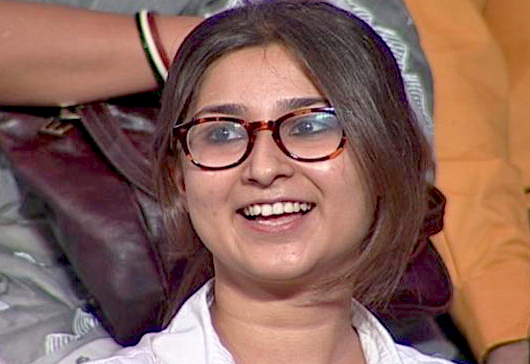
New Delhi, May 20: On Friday, West Bengal Chief Minister Mamata Banerjee called Presidency University student Taniya Bhardwaj a CPI(M) cadre and a Maoist for asking a question about the conduct of senior state ministers and officials over crimes against women.
The question was asked at an open house session with the Chief Minister, conducted by CNN-IBN to mark one year of the Trinamool Congress's coming to power in West Bengal.
An angry Banerjee castigated the audience for asking 'CPI(M) questions' and 'Maoist questions' and stormed out, refusing to participate further. Taniya Bhardwaj writes an open letter to Mamata Banerjee.
Dear 'Simple Man',
On being asked a simple question, you acquired a complicated avatar. We all went to the CNN-IBN question-answer session on Friday, May 18, at the Town Hall expecting to hear some heated exchanges, but it got too hot to handle.
You, the most important person in West Bengal, labelled me and the rest of the audience 'Maoist and CPM cadres'. What exactly did we do to deserve this honour? We asked you questions. I asked you whether affiliates of your party, specifically minister Madan Mitra and MP Arabul Islam, who wield power, should act, or should have acted, more responsibly.
Like many others, I was also greatly disturbed when Madan Mitra pronounced his own judgement on a rape victim before the police were done investigating. This woman, whose character was assassinated, is an Anglo-Indian, a member of the minority community. Thus, if we were to even forget about sensitivity, the question of political correctness still hangs over his conduct.
A few months ago, this very same man had misbehaved with policemen who had stopped his car on the Eastern Metropolitan Bypass as part of its routine. As for the Arabul Islam case, it is still making headlines.
I asked you something that had been on the minds of most people around me, people who voted for 'paribartan' (change). Is this what we expect of our leaders? The ones who set examples and whom people follow. This is all that I wanted to know. What I got to know, instead, is that in West Bengal, asking a question can be the equivalent of being a Maoist.
'Simple man', you claimed with pride on stage that you're not a feminist.
That proclamation did not surprise us, especially after the Katwa and Park Street cases. You also spoke of democracy. The answers you gave to the questions you took before mine were sprinkled with words like ‘people’, 'democracy', and 'Bengal'.
But one of the most important features of a true democracy, which I have learnt as a student of political science, is freedom of expression. This freedom is the one that allows an individual to express oneself, to not have to mince words out of fear of authority. It involves enjoying a chuckle or two at cartoon about important public figures.
Sadly, there seems to be a gradual failure in this aspect of the democratic machinery in the state. And just like I won’t become a Maoist simply because you called me one, the state too won’t epitomize democracy unless it is truly so in all spheres. All said and done, what you did was in haste and it made me the centre of attention. And as you stomped off in fury, you automatically assumed the role of the spoilsport.
It would have been so much more ‘simple’ had you just answered my question, or even said “No comments” and moved on. The question became so important because you chose to make it important.
You have spoken of 'brain drain' so many times. I hold offers from the University College, London and the School of Oriental and African Studies to study development and administration. I too will probably leave, and now you know the reason why. Had you stayed on, it would have been fun. And you would have honestly been 'a Chief Minister with a difference'. The role of your office as Chief Minister is to aggregate interest – you should at the least have heard us all out.
"Nearly all men can stand adversity, but if you want to test a man's character, give him power". So said Abraham Lincoln.
Love
A Simple Woman – Taniya Bhardwaj





Comments
Add new comment